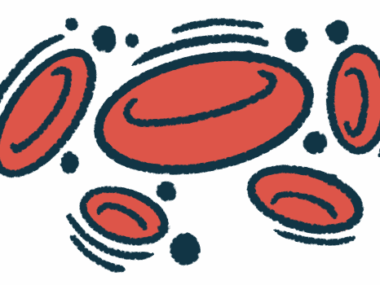Using Soliris for PNH lowers blood clot, mortality risk: Study
Greatest survival benefit seen in patients with highest disease activity
Written by |

Soliris (eculizumab) treatment was associated with a nearly 50% reduction in mortality risk and a 60% lower risk of blood clots or other major blood vessel-related events in people with paroxysmal nocturnal hemoglobinuria (PNH), according to data from a global registry study.
Those having the greatest survival benefits were those with the highest disease activity before starting treatment.
“This analysis of the International PNH Registry of more than 4,000 patients found that treatment with [Soliris] improved patient survival compared with the untreated cohort at a comparable time point in their disease course,” wrote the researchers, who noted the benefits were sustained through more than 14 years of real-world follow-up in some cases.
The registry findings were reported in “Long-term effectiveness of eculizumab: Data from the International PNH Registry” in the European Journal of Haematology. The research was funded by Alexion, a part of AstraZeneca Rare Disease, which markets Soliris.
PNH outcomes with Soliris
PNH is marked by the destruction of red blood cells, called hemolysis. Spontaneous mutations in blood cell precursors result in the immune system’s complement pathway driving inflammatory attacks against blood cells.
The disease is also marked by the activation of platelets — cell fragments involved in blood clotting — contributing to an increased risk of thromboembolic events, or blood clots.
Blood clotting complications are the leading cause of death for untreated patients, accounting for about 40-67% of deaths with a known cause, according to researchers.
Soliris, a complement-targeted antibody approved for PNH, could improve survival and lower the risk of thromboembolic events, but large, real-world, studies investigating that possibility are lacking, according to the researchers, who used data from the International PNH Registry (NCT01374360) — the largest global database of PNH patients — to estimate the occurrence of major adverse blood vessel-related complications and survival among patients treated or not treated with Soliris.
They evaluated data from 4,118 patients enrolled in the registry from March 2007 to February 2022, including 1,613 treated with Soliris for more than 35 days, and 2,505 who hadn’t received Soliris or any other complement inhibitor (untreated group).
Overall, 52.5% of patients were female, with a median age at the onset of PNH onset being 38.8. The patients treated with Soliris were younger at disease onset than the untreated patients (median, 35.2 vs 42.1).
At baseline, meaning the earliest date of starting Soliris or enrollment in the registry, those in the Soliris group more often showed typical laboratory features of PNH, including a higher ratio of lactate dehydrogenase, a marker of tissue damage, as well as a greater median percentage of GPI-deficient granulocytes than untreated patients.
Granulocytes are a family of immune cells. The GPI molecule on their surface helps anchor proteins important for preventing misdirected autoimmune attacks. The lack of GPI makes cells more vulnerable to complement-mediated immune attacks and is a hallmark feature of PNH.
A larger proportion of Soliris-treated patients also had a baseline history of major vascular events (23.9% vs. 10.8%) and blood clots (19.8% vs. 7%), reflecting a generally more severe disease course.
A smaller proportion of Soliris-treated patients had bone marrow failure, which occurs when the bone marrow is unable to produce enough healthy blood cells (45.5% vs. 79.2%).
Improved survival benefit with Soliris
A statistically significant 49% improvement in survival was associated with Soliris treatment over 14 years.
Other clinical factors associated with better survival included a younger age at disease onset, being female, having no history of BMF, not being dependent on blood transfusions, and having better indicators of kidney function at baseline.
After adjusting for these factors in final analyses, results indicated the survival benefit of Soliris was most pronounced among those considered to have high disease activity at baseline and among those with at least 50% GPI-deficient granulocytes.
Soliris-treated patients were also found to be at about a 60% lower risk of having blood clots or other major vascular events while on Soliris over periods when they were untreated.
“The findings of this analysis add to the considerable body of real-world evidence demonstrating the long-term survival benefits as well as meaningful reduction in the occurrence of [thromboembolic events] and [major adverse vascular events] associated with [Soliris] in patients with PNH,” the researchers wrote, noting the data “provide a substantial patient sample and contemporaneous data for comparator populations.”






